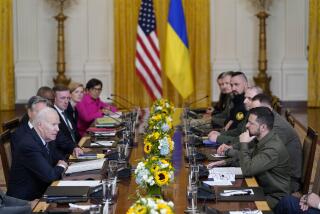Fighting Hussein and Disunity
- Share via
President Clinton and Congress want to spend a lot of money--close to $100 million--to aid Iraqi opposition groups that are believed to be as eager as the U.S. government is to see the last of Saddam Hussein. Encouraging the Iraqi regime’s disparate internal opponents isn’t new. The CIA earlier worked covertly though not very effectively with some of them, the Kurds in northern Iraq especially. Now, after last year’s passage by Congress of the Iraq Liberation Act, the effort to overthrow Hussein is in the open. The trouble is that Iraq’s dissidents lack cohesion, distrusting each other almost as much as they do the regime that oppresses them. That dampens chances of a united front against Hussein any time soon.
A U.S.-sponsored conference of about 300 representatives of Iraqi opposition groups has again shown that while the dissidents know what they’re against, they’re a long way from agreeing what they’re for. Yet even before the four-day meeting of the umbrella Iraqi National Congress convened in New York, a State Department official pronounced it a success because it would get the factions talking about common goals. That set a low threshold for accomplishment.
Internal opposition in any police state is hard if not impossible to sustain, and Iraq is a police state nonpareil, with the regime’s spies everywhere. Additionally, the primary loyalties of most Iraqis are not national but tribal, religious and ethnic, producing a mind-set that works against inter-communal cooperation.
A post-Hussein democratic Iraq is a worthy dream. But it will remain a dream until Hussein’s opponents are able to find common political purpose. The New York meeting was only the second time in seven years the Iraqi National Conference has met. That says all that needs to be said about the self-defeating lack of unity among Hussein’s foes.
More to Read
Sign up for Essential California
The most important California stories and recommendations in your inbox every morning.
You may occasionally receive promotional content from the Los Angeles Times.












